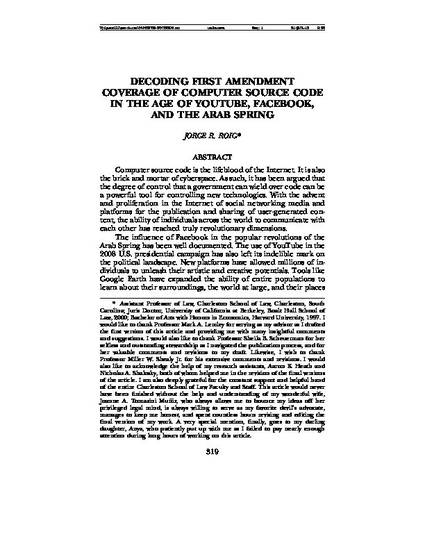
Article
Decoding First Amendment Coverage of Computer Source Code in the Age of YouTube, Facebook and the Arab Spring
NYU Annual Survey of American Law
(2012)
Abstract
Computer source code is the lifeblood of the Internet. It is also the brick and mortar of cyberspace. As such, it has been argued that the degree of control that a government can wield over code can be a powerful tool for controlling new technologies. With the advent and proliferation in the Internet of social networking media and platforms for the publication and sharing of user-generated content, the ability of individuals across the world to communicate with each other has reached truly revolutionary dimensions.
The influence of Facebook in the popular revolutions of the Arab Spring has been well documented. The use of YouTube in the 2008 US Presidential campaign has also left its indelible mark in the political landscape. New platforms have allowed millions of individuals to unleash their artistic and creative potentials. Tools like Google Earth have expanded the ability of entire populations to learn about their surroundings, the world at large, and their places in it. The combination of smartphones and Twitter has created new tactics for protests and redefined the way in which individuals assemble to petition their government for a redress of grievances.
The time has come to reconsider the issue of whether computer source code is “speech” for First Amendment purposes, and how the government can regulate it in a manner consistent with First Amendment values. This article proposes a three-step framework for analyzing questions of First Amendment coverage consistent with Supreme Court doctrine. In applying this framework to computer source code, this article also explores the relation between the different values that have been ascribed to the First Amendment, discusses some insights regarding the speech-conduct distinction, and considers the extent of First Amendment coverage in general.
Keywords
- First Amendment,
- First Amendment Coverage,
- Speech,
- Computer,
- Internet,
- Source Code,
- Computer Code,
- Code,
- YouTube,
- Facebook,
- Arab Spring
Disciplines
Publication Date
2012
Citation Information
Jorge R. Roig, Decoding First Amendment Coverage of Computer Source Code in the Age of YouTube, Facebook and the Arab Spring, 68 N.Y.U. Ann. Surv. Am. L. 319 (2012). Available at: http://works.bepress.com/jorge_roig/1.
Creative Commons license

This work is licensed under a Creative Commons CC_BY International License.
